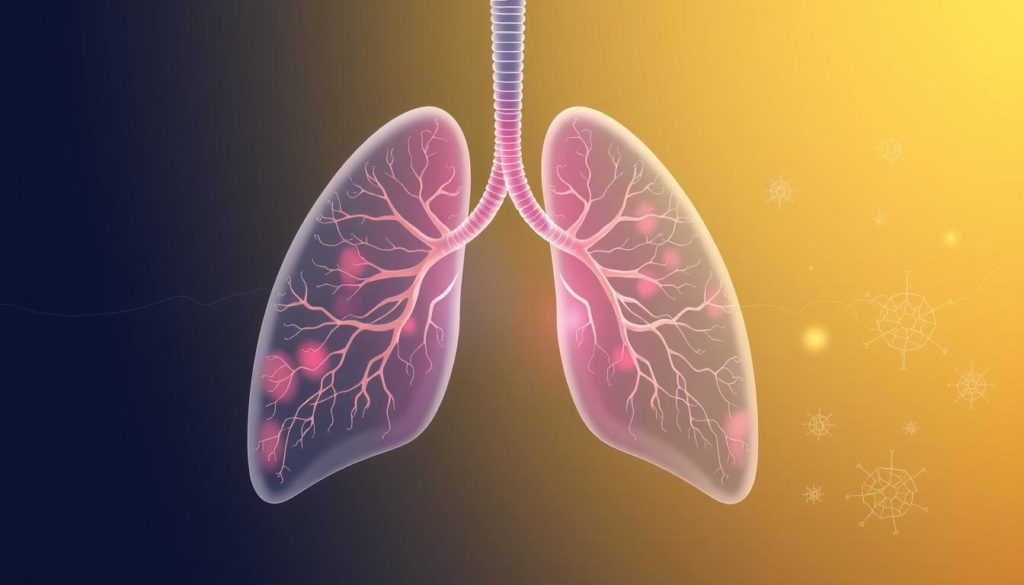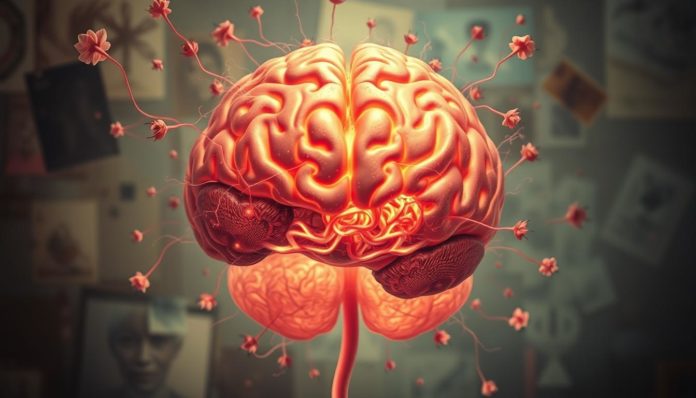Did you know nearly 60% of people with Alzheimer’s face respiratory issues? This fact points to a key aspect of managing Alzheimer’s that we often miss. It’s vital to know how breathing problems and Alzheimer’s interact, for everyone involved.
This article explores how lung health impacts cognitive functions and Alzheimer’s symptoms. With more people getting Alzheimer’s, understanding the link between lung and brain health is crucial.
The Connection Between Lung Function and Cognitive Health
Recent studies show a deep link between our lungs and brain health. The way our lungs work is key to getting enough oxygen to the brain. Knowing how our lungs and brain interact shows us that lung health affects our thinking and brain power.

How Lung Health Affects the Brain
Our lungs play a big role in getting oxygen to our blood, which is crucial for our brain. If our respiratory system isn’t working well, our brain gets less oxygen. This can harm how we think. For instance, people with chronic obstructive pulmonary disease (COPD) often see a drop in their mental abilities. This shows why it’s important to keep our lungs healthy.
Understanding Pulmonary Issues and Memory Loss
Long-term lung problems like asthma, emphysema, and bronchitis can harm our brain health. When our body doesn’t get enough oxygen, it can lead to big memory issues. People with chronic lung diseases often struggle with memory, showing how crucial our lungs are for our brain. Taking care of our lung health might help prevent some memory problems.
Respiratory Difficulties in Alzheimer’s Patients
Alzheimer’s disease comes with many challenges, including respiratory difficulties. These breathing issues can greatly impact the patient’s quality of life.

Common Breathing Disorders
Alzheimer’s patients often face breathing problems. They can have sleep apnea, chronic obstructive pulmonary disease (COPD), and aspiration pneumonia. These conditions make breathing harder, so it’s key for those caring for them to watch their lung health closely.
Impact on Daily Life
Respiratory troubles in Alzheimer’s patients affect their daily life and independence. These issues might cause them to go to the hospital often and move less. It’s hard for them to do simple daily tasks, hurting their quality of life. Managing these breathing problems is crucial for helping patients keep some normality in their daily lives.
The Role of Shortness of Breath in Cognitive Decline
Recent studies show a link between shortness of breath and thinking problems, especially in Alzheimer’s. Shortness of breath is not just uncomfortable. It may also speed up Alzheimer’s. This happens because the stress from not breathing well affects brain health.
When people with Alzheimer’s can’t breathe well, it might make their thinking worse. This is because their brains don’t get enough oxygen. This drop in mental ability can make Alzheimer’s progress faster.
Shortness of breath affects those with Alzheimer’s in many ways. It makes physical activities harder and adds emotional stress. Treating breathing problems early could help slow down loss of brain function. It could also make life better for Alzheimer’s patients.
It’s important to understand how breathing difficulty affects the mind. Ongoing research aims to find better ways to tackle this issue. Helping patients breathe easier could improve their day-to-day life. It might also slow down the mental decline caused by Alzheimer’s.
Recognizing Early Signs of Breathing Problems
Finding breathing issues early is key to staying healthy and handling diseases, like Alzheimer’s. Spotting these signs quickly helps get the right care fast. This leads to better health and life for the person.
Symptoms to Watch For
There are certain symptoms that should raise concern:
- Shortness of breath during everyday tasks
- Persistent cough that lasts
- Wheezing or noisy breaths
- Getting sick often, like with bronchitis
- Fatigue or dizzy feelings from breathing troubles
Seeing these symptoms might mean there’s a bigger health issue. Early help could make a big difference.
When to Seek Medical Advice
Knowing when to see a doctor for breathing problems can be tough. Here are times when it’s important to get medical help:
- When breathing troubles mess with daily life or sleep
- If breathing changes a lot in a short time
- When symptoms don’t get better with home care or over-the-counter meds
- If breathing problems come with other signs of neurological issues, it’s time to see an Alzheimer’s specialist
- Feeling chest pain or pressure with other breathing issues
Noticing these signs and getting help quickly is important. It helps get the best care sooner, helping with breathing and brain health.
Breathing Problems and Alzheimer’s
New studies suggest a strong link between how well we breathe and the risk of Alzheimer’s disease. This discovery is guiding more research into how these issues connect.
Statistical Correlations
Looking at data from various studies, it’s clear that poor breathing can increase the risk of Alzheimer’s. This information comes from careful analysis of patients over time. It shows that breathing issues might predict the start of memory problems.
Research and Findings
Many studies have highlighted the role of breathing in Alzheimer’s disease. They offer new insights. Researchers found problems like COPD and sleep apnea can worsen brain health. These discoveries shed light on Alzheimer’s complexity, showing the value of good respiratory health as we age.
How Neural Degeneration Affects Breathing
Breathing is a crucial function that our brainstem controls. When Alzheimer’s disease hits, it can damage these control paths. This leads to problems in keeping breathing steady and effective.
Neural degeneration messes with the signals that manage breathing. This affects how we breathe in rhythm and depth. It decreases how well we breathe, impacting how our body gets oxygen. The issues from Alzheimer’s make it important to know how much the neurons are involved.
With Alzheimer’s, the harm to neural paths makes controlling breathing hard. Below is a table showing how different stages of neural damage affect breathing:
| Stage of Neural Degeneration | Effect on Respiratory Control | Alzheimer’s Complications |
|---|---|---|
| Early Stage | Mild disruptions in breathing regularity | Minor shortness of breath |
| Mid Stage | Noticeable breathing irregularities | Increased fatigue and oxygen deprivation |
| Late Stage | Severe respiratory dysfunction | High risk of respiratory failure |
Keeping track of these changes helps manage Alzheimer’s better. By focusing on the affected neural pathways, caregivers and doctors can predict and address breathing issues.
The Impact of Breathing Issues on Brain Health
Breathing problems can deeply affect our brain’s health, leading to various challenges. This section discusses how something like hypoxia can harm the brain. It can cause brain damage and make diseases like Alzheimer’s worse.
Reduced Oxygen Levels
Hypoxia means there’s not enough oxygen, and this can really affect how we think. The brain needs steady oxygen to work well. Without enough oxygen, memory and thinking skills can get worse. This can harm brain health over time.
Neurological Implications
Breathing issues that lead to hypoxia can worsen or lead to brain problems. Less oxygen can damage the brain and speed up diseases that affect the brain. These problems harm not just how we think but also the quality of our lives.
| Breathing Issue | Brain Health Impact | Cognitive Outcomes |
|---|---|---|
| Hypoxia | Brain damage | Memory loss, impaired thinking |
| Chronic Respiratory Disorders | Accelerated neurodegenerative disease | Progressive cognitive decline |
Managing Respiratory Problems in Alzheimer’s
Alzheimer’s management deals with respiratory issues that come with the disease. Using medicines, therapies, and caring at home can help a lot. It makes life better for patients and helps caregivers too.
Medications and Therapies
Patients may use medicines like bronchodilators and corticosteroids for easier breathing. For serious cases, doctors might suggest extra oxygen or gentle ventilation. Pulmonary rehabilitation is another helpful approach.
It’s also key to incorporate physical, occupational, and speech therapy. These help with breathing and support brain health. This makes managing Alzheimer’s more effective.
Home Care Strategies
Home care is vital for handling respiratory issues in Alzheimer’s. Keeping the home clean reduces allergens. Watching the air quality helps too. Plus, daily breathing exercises can strengthen the lungs.
- Create a smoke-free environment: It’s important to avoid smoke and pollutants for lung health.
- Use air humidifiers: Moist air can make breathing easier.
- Ensure proper hydration: Drinking lots of fluids keeps the airways open.
Managing Alzheimer’s requires patience and focus. With the right meds, therapies, and home care, caregivers can truly support their loved ones. This improves life for those facing Alzheimer’s.
Innovative Treatments and Research
As the field evolves, clinical trials have become key in Alzheimer’s research. They explore new ways to improve treatments for the disease. These studies try to better patient care through new therapies and research.
One exciting study focuses on drugs that target lung inflammation. This work shows that less inflammation in the lungs can boost brain function. These treatments could change how we manage Alzheimer’s and even slow its progression.
Another critical research area is non-drug treatments. These are things like lung therapy and exercises designed for Alzheimer’s patients. Early clinical trials show these can improve lung health and life quality.
“We are witnessing incredible advancements in the realm of respiratory treatment advances, and the implications for Alzheimer’s innovation are profound,” says Dr. Samantha Roberts, head of neurology at a leading research institute.
Also, studies are looking into the genes that affect lung health and brain decline. Finding these genes could lead to treatments that are specific to each person. This means more effective care for patients.
- New drug treatments targeting lung inflammation.
- Non-pharmacological interventions, including specialized respiratory therapies.
- Genetic studies for personalized treatment approaches.
In summary, there’s a lot of hope in Alzheimer’s research and treatment. Clinical trials, new research, and breakthroughs in treatment are all working together. This means we could see better results for patients soon, bringing hope to many.
Breathing Exercises to Improve Lung Function
Simple breathing exercises every day can greatly increase lung capacity. This is especially helpful for people with Alzheimer’s. Using specific methods can help improve breathing and support brain function. We will look at easy techniques that can be added to daily life to improve lung health.
Simple Techniques for Daily Practice
Doing special breathing exercises regularly can really help increase lung size. Diaphragmatic breathing is one good exercise. You breathe in deeply through your nose, let your diaphragm extend fully, and breathe out slowly through your mouth. Another is pursed-lip breathing, where you breathe in through your nose and out through lips that are close together, making the breath out take longer. These can be done many times a day and only take a few minutes.
Benefits for Alzheimer’s Patients
For people with Alzheimer’s, breathing exercises are a key part of their care. These exercises can lower stress, improve blood oxygen, and boost lung health. Many care providers and patients see real benefits in mental and physical health from these exercises. This shows the value of making breathing exercises a regular part of caring for Alzheimer’s.
FAQ
How does lung health impact cognitive function?
Having healthy lungs is key for the brain to get enough oxygen. Poor lung function can drop brain oxygen levels. This may lead to cognitive issues and diseases like Alzheimer’s.
What are some common respiratory difficulties in Alzheimer’s patients?
Patients with Alzheimer’s often face breathing problems like sleep apnea and COPD. These can worsen their life quality and their cognitive symptoms.
Can shortness of breath accelerate Alzheimer’s progression?
Yes, dealing with shortness of breath can make Alzheimer’s patients more anxious and stressed. Over time, not getting enough oxygen can also damage the brain.
What early signs of breathing problems should I watch for?
Keep an eye out for a constant cough, breathing troubles, wheezing, or a feeling of tightness in the chest. These can be early signs of breathing issues that need a doctor’s check, especially for those with Alzheimer’s.
What do studies say about the correlation between breathing problems and Alzheimer’s?
Studies have found a strong link between breathing problems and faster Alzheimer’s progression. Those with chronic respiratory issues often decline faster intellectually than those without.
How does neural degeneration in Alzheimer’s affect breathing?
Neural degeneration messes up the brain’s control over breathing. This can lead to unstable breathing patterns and more lung problems.
What are the neurological implications of reduced oxygen levels in Alzheimer’s patients?
Lower oxygen levels can harm the brain and make Alzheimer’s symptoms worse. It is essential to keep oxygen levels up for brain health.
How can respiratory problems be managed in Alzheimer’s patients?
Treatment includes drugs, breathing therapies, and care at home. Getting the right medical care and support from caregivers is vital to improve life quality and handle breathing issues.
What are some innovative treatments for respiratory issues in Alzheimer’s patients?
New treatments include advanced breathing therapies and experimental drugs. Research is also being done to boost lung health and breathing in those with Alzheimer’s.
Are there breathing exercises that can help improve lung function in Alzheimer’s patients?
Yes, simple breathing techniques can improve lung health. Exercises like deep breathing can really help Alzheimer’s patients live better.


